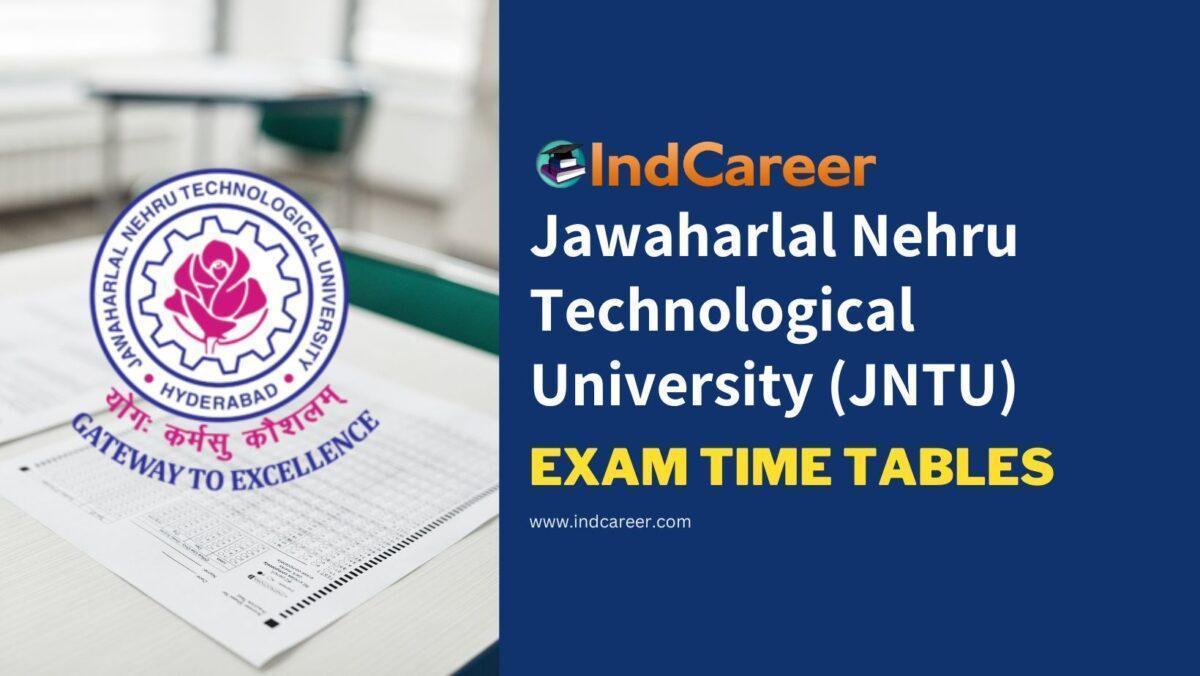Contents
Jawaharlal Nehru Technological University (JNTU) Exam Time Tables are listed here. These are the official time tables released by Jawaharlal Nehru Technological University (JNTU) on their official website.
NTU Hyderabad releases its exam time tables well in advance to ensure that students have sufficient time to prepare. The exam time tables are usually released on the official website of the university, and students are advised to check the website regularly for updates and notifications.
Jawaharlal Nehru Technological University (JNTU) Exam Time Tables
List of latest timetables released by Jawaharlal Nehru Technological University (JNTU) is given below. Students can download Jawaharlal Nehru Technological University (JNTU) time table PDF.
The JNTU Hyderabad exam time tables are usually released a few weeks before the commencement of the examinations. The university releases separate exam schedules for each course and semester, providing students with clear information about the date, time, and venue of their examinations. Students are advised to carefully check the JNTU Hyderabad exam time tables and prepare accordingly to ensure a smooth and stress-free examination experience.
To access the JNTU Hyderabad exam time tables, students can visit the official website of the university and navigate to the “Examinations” section. They can then select their respective course and semester to view the exam schedule. The JNTU Hyderabad exam time tables can also be accessed through the university’s mobile app, which provides convenient access to exam schedules, results, and other important information.
It is important for students to keep track of the JNTU Hyderabad exam time tables and follow them strictly to avoid any last-minute confusion or delays. Students are advised to plan their preparation schedule in advance, allotting adequate time for revision and practice. They should also ensure that they carry their hall tickets and other required documents to the examination hall on the day of the exam.
About Jawaharlal Nehru Technological University (JNTU)
Jawaharlal Nehru Technological University (JNTU) Hyderabad is a premier institution of higher education in the state of Telangana, India. It was established in 1965 as the Nagarjuna Sagar Engineering College and later became a university in 1972. The university has a strong focus on engineering, technology, and management education, offering undergraduate, postgraduate, and doctoral programs in various fields.
One of the key aspects of JNTU Hyderabad is its emphasis on research and innovation. The university has established several research centers and institutes, including the Center for Nano Science and Technology, Center for Energy Technology, and Center for Water Resources. These research centers provide opportunities for faculty and students to engage in cutting-edge research in their respective fields.
JNTU Hyderabad also has a strong industry-academia interface, with partnerships and collaborations with leading companies and organizations in various sectors. This helps students gain exposure to the latest trends and technologies in their field and provides them with practical training and internship opportunities.
Frequently Asked Questions (FAQs)
The JNTU Hyderabad exam time tables are usually released a few weeks before the commencement of the examinations.
Students can access the JNTU Hyderabad exam time tables by visiting the official website of the university and navigating to the “Examinations” section. They can then select their respective course and semester to view the exam schedule.
Yes, the JNTU Hyderabad exam time tables can also be accessed through the university’s mobile app, which provides convenient access to exam schedules, results, and other important information.
The JNTU Hyderabad exam time tables provide clear information about the date, time, and venue of the examinations for each course and semester.
Students should immediately bring any discrepancies or conflicts in the JNTU Hyderabad exam time tables to the attention of the university authorities for resolution. It is important to clarify any doubts well in advance to avoid any last-minute confusion or delays.
